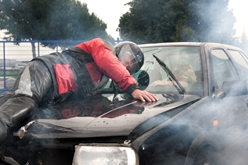
If you were riding a motorcycle and were struck by another vehicle head-on, you know how terrifying these accidents can be. Head-on collisions occur when the front ends of two vehicles crash into each other. Serious property damages, injuries, and fatalities are the result—especially to the motorcyclist who does not have the protection of a vehicle surrounding him. Sadly, even though the other driver’s liability may be clear, you will most likely have to fight his insurance company to obtain the compensation for your lost wages, expensive medical bills, and physical and emotional trauma that you could be entitled to.
Common Causes of Motorcycle Head-On Collisions
Head-on crashes occur when a driver veers into an oncoming lane or drives the wrong way on a one-way street. They are mainly caused by a motorist’s negligent driving. Common reasons these deadly wrecks happen include:
- Distracted driving. Drivers can become distracted in a number of ways, such as talking on cell phones, texting, eating and drinking, and fiddling with a GPS or instrument controls. Whenever a person is distracted, his eyes and mind can be off his driving, and he can easily veer into a lane or turn onto a road he shouldn’t be on in a few seconds.
- Impaired driving. If a driver is intoxicated—either on alcohol or drugs—his concentration, reasoning, and reaction time are slowed. In addition, these substances can make him drowsy. All of these can contribute to him sliding into the wrong lane or driving the wrong way on a one-way street or highway ramp—which can be even more dangerous to unsuspecting motorcyclists.
- Driver fatigue. When drivers become drowsy or fatigued, they can easily nod off. Even a few seconds of this mindless driving can cause a head-on crash with a motorcyclist. Truckers who drive long hours without a break—sometimes in violation of federal regulations—can cause deadly head-on collisions with motorcycle riders.
- Trying to beat a light. If a driver is turning left and trying to beat a red light, he can swerve into an oncoming motorcyclist when he attempts to speed through his left turn.
- Speeding and racing. When drivers are driving at an excessive speed or racing, they may lose control of their vehicles and swerve into an oncoming bike in their attempt to gain control.
- Passing on a two–lane road. If a driver is attempting to pass a slower vehicle on a two-lane road, he may not leave sufficient time to safely pass or may not even see an oncoming motorcycle—which is harder for people to see in general—and find himself with nowhere to go except head-on into the bike.
- Debris on the road. Debris on roadways can cause motorists to suddenly swerve to avoid the obstacle, causing them to cross the median and veer into oncoming traffic.
- Losing control on a curve. When a driver takes a curve too fast or otherwise loses control of his vehicle on a curve, he can easily find himself in the wrong lane. This is another common cause of deadly head-on collisions.
Types of Injuries You Could Suffer in a Head-On Collision
Head-on crashes tend to cause more serious injuries and fatalities for a number of reasons—even more likely if you were not wearing a motorcycle helmet. First, the force of the impact can be greater—especially when the negligent driver is going the wrong way on a highway or busy roadway. In addition, these drivers do not have sufficient time to engage in crash avoidance behaviors like slowing down, slamming on their brakes, or swerving back into their lanes if they are drowsy, drunk, or driving the wrong way on a one-way road. Common injuries you could suffer include:
- Traumatic brain injuries and other head injuries
- Spinal injuries—some causing partial or complete paralysis
- Broken bones, including to your face
- Neck injuries
- Amputation
- Fractures
- Soft-tissue injuries
- Internal organ damage
Were you injured in a motorcycle head-on collision caused by another driver? Was a family member killed? The Brauns Law Accident Injury Lawyers, PC legal team is here to help you fight for the compensation you deserve. Call us directly at 404-418-8244 or toll free at 877-401-6689 to schedule a free consultation.
Related Links:














